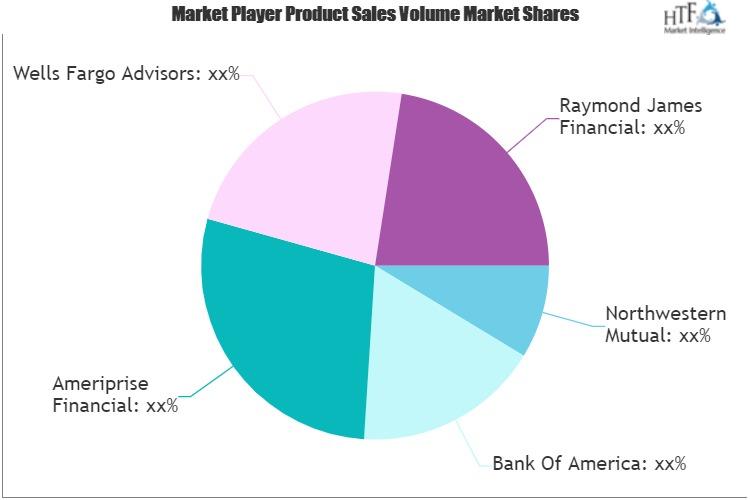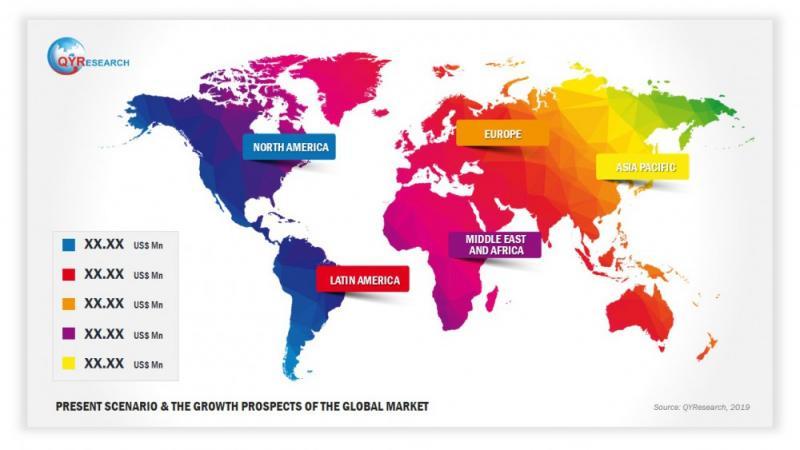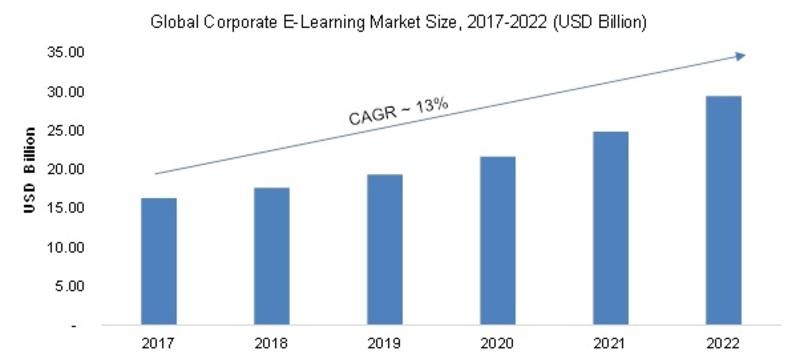Press release
Global Particulate Matter Sensors Market Insights, Forecast
The Particulate Matter Sensors market was valued at Million US$ in 2017 and is projected to reach Million US$ by 2025, at a CAGR of during the forecast period. In this study, 2017 has been considered as the base year and 2018 to 2025 as the forecast period to estimate the market size for Particulate Matter Sensors
Get sample copy of the report:
https://www.marketdensity.com/contact?ref=Sample&reportid=53826
Table of Contents:
Table of Contents
1 Study Coverage
1.1 Particulate Matter Sensors Product
1.2 Key Market Segments in This Study
1.3 Key Manufacturers Covered
1.4 Market by Type
1.4.1 Global Particulate Matter Sensors Market Size Growth Rate by Type
1.4.2 PM2.5
1.4.3 PM10
1.4.4 Other
1.5 Market by Application
1.5.1 Global Particulate Matter Sensors Market Size Growth Rate by Application
1.5.2 Automotive
1.5.3 Environmental Monitoring
1.5.4 Aerospace & Defense
1.5.5 Other
1.6 Study Objectives
1.7 Years Considered
2 Executive Summary
2.1 Global Particulate Matter Sensors Market Size
2.1.1 Global Particulate Matter Sensors Revenue 2013-2025
2.1.2 Global Particulate Matter Sensors Production 2013-2025
2.2 Particulate Matter Sensors Growth Rate (CAGR)
2.3 Analysis of Competitive Landscape
2.3.1 Manufacturers Market Concentration Ratio (CR5 and HHI)
2.3.2 Key Particulate Matter Sensors Manufacturers
2.3.2.1 Particulate Matter Sensors Manufacturing Base Distribution, Headquarters
2.3.2.2 Manufacturers Particulate Matter Sensors Product Offered
2.3.2.3 Date of Manufacturers Enter into Particulate Matter Sensors Market
2.4 Key Trends for Particulate Matter Sensors Markets & Products
3 Market Size by Manufacturers
3.1 Particulate Matter Sensors Production by Manufacturers
3.1.1 Particulate Matter Sensors Production by Manufacturers
3.1.2 Particulate Matter Sensors Production Market Share by Manufacturers
3.2 Particulate Matter Sensors Revenue by Manufacturers
3.2.1 Particulate Matter Sensors Revenue by Manufacturers
3.2.2 Particulate Matter Sensors Revenue Share by Manufacturers
3.3 Particulate Matter Sensors Price by Manufacturers
3.4 Mergers & Acquisitions, Expansion Plans
4 Particulate Matter Sensors Production by Regions
4.1 Global Particulate Matter Sensors Production by Regions
4.1.1 Global Particulate Matter Sensors Production Market Share by Regions
4.1.2 Global Particulate Matter Sensors Revenue Market Share by Regions
4.2 United States
4.2.1 United States Particulate Matter Sensors Production
4.2.2 United States Particulate Matter Sensors Revenue
4.2.3 Key Players in United States
4.2.4 United States Particulate Matter Sensors Import & Export
4.3 Europe
4.3.1 Europe Particulate Matter Sensors Production
4.3.2 Europe Particulate Matter Sensors Revenue
4.3.3 Key Players in Europe
4.3.4 Europe Particulate Matter Sensors Import & Export
4.4 China
4.4.1 China Particulate Matter Sensors Production
4.4.2 China Particulate Matter Sensors Revenue
4.4.3 Key Players in China
4.4.4 China Particulate Matter Sensors Import & Export
4.5 Japan
4.5.1 Japan Particulate Matter Sensors Production
4.5.2 Japan Particulate Matter Sensors Revenue
4.5.3 Key Players in Japan
4.5.4 Japan Particulate Matter Sensors Import & Export
4.6 South Korea
4.6.1 South Korea Particulate Matter Sensors Production
4.6.2 South Korea Particulate Matter Sensors Revenue
4.6.3 Key Players in South Korea
4.6.4 South Korea Particulate Matter Sensors Import & Export
4.7 Other Regions
4.7.1 Taiwan
4.7.2 India
4.7.3 Southeast Asia
5 Particulate Matter Sensors Consumption by Regions
5.1 Global Particulate Matter Sensors Consumption by Regions
5.1.1 Global Particulate Matter Sensors Consumption by Regions
5.1.2 Global Particulate Matter Sensors Consumption Market Share by Regions
5.2 North America
5.2.1 North America Particulate Matter Sensors Consumption by Application
5.2.2 North America Particulate Matter Sensors Consumption by Countries
5.2.3 United States
5.2.4 Canada
5.2.5 Mexico
5.3 Europe
5.3.1 Europe Particulate Matter Sensors Consumption by Application
5.3.2 Europe Particulate Matter Sensors Consumption by Countries
5.3.3 Germany
5.3.4 France
5.3.5 UK
5.3.6 Italy
5.3.7 Russia
5.4 Asia Pacific
5.4.1 Asia Pacific Particulate Matter Sensors Consumption by Application
5.4.2 Asia Pacific Particulate Matter Sensors Consumption by Countries
5.4.3 China
5.4.4 Japan
5.4.5 South Korea
5.4.6 India
5.4.7 Australia
5.4.8 Indonesia
5.4.9 Thailand
5.4.10 Malaysia
5.4.11 Philippines
5.4.12 Vietnam
5.5 Central & South America
5.5.1 Central & South America Particulate Matter Sensors Consumption by Application
5.5.2 Central & South America Particulate Matter Sensors Consumption by Country
5.5.3 Brazil
5.6 Middle East and Africa
5.6.1 Middle East and Africa Particulate Matter Sensors Consumption by Application
5.6.2 Middle East and Africa Particulate Matter Sensors Consumption by Countries
5.6.3 GCC Countries
5.6.4 Egypt
5.6.5 South Africa
6 Market Size by Type
6.1 Global Particulate Matter Sensors Production by Type
6.2 Global Particulate Matter Sensors Revenue by Type
6.3 Particulate Matter Sensors Price by Type
7 Market Size by Application
7.1 Overview
7.2 Global Particulate Matter Sensors Breakdown Dada by Application
7.2.1 Global Particulate Matter Sensors Consumption by Application
7.2.2 Global Particulate Matter Sensors Consumption Market Share by Application
8 Manufacturers Profiles
8.1 Delphi
8.1.1 Delphi Company Details
8.1.2 Company Overview
8.1.3 Delphi Particulate Matter Sensors Production Revenue and Gross Margin
8.1.4 Delphi Particulate Matter Sensors Product Description
8.1.5 Delphi Recent Development
8.2 Sensirion
8.2.1 Sensirion Company Details
8.2.2 Company Overview
8.2.3 Sensirion Particulate Matter Sensors Production Revenue and Gross Margin
8.2.4 Sensirion Particulate Matter Sensors Product Description
8.2.5 Sensirion Recent Development
8.3 Shinyei Technology
8.3.1 Shinyei Technology Company Details
8.3.2 Company Overview
8.3.3 Shinyei Technology Particulate Matter Sensors Production Revenue and Gross Margin
8.3.4 Shinyei Technology Particulate Matter Sensors Product Description
8.3.5 Shinyei Technology Recent Development
8.4 Honeywell
8.4.1 Honeywell Company Details
8.4.2 Company Overview
8.4.3 Honeywell Particulate Matter Sensors Production Revenue and Gross Margin
8.4.4 Honeywell Particulate Matter Sensors Product Description
8.4.5 Honeywell Recent Development
8.5 Mouser
8.5.1 Mouser Company Details
8.5.2 Company Overview
8.5.3 Mouser Particulate Matter Sensors Production Revenue and Gross Margin
8.5.4 Mouser Particulate Matter Sensors Product Description
8.5.5 Mouser Recent Development
8.6 Hitachi Automotive Systems
8.6.1 Hitachi Automotive Systems Company Details
8.6.2 Company Overview
8.6.3 Hitachi Automotive Systems Particulate Matter Sensors Production Revenue and Gross Margin
8.6.4 Hitachi Automotive Systems Particulate Matter Sensors Product Description
8.6.5 Hitachi Automotive Systems Recent Development
8.7 Infineon Technologies AG
8.7.1 Infineon Technologies AG Company Details
8.7.2 Company Overview
8.7.3 Infineon Technologies AG Particulate Matter Sensors Production Revenue and Gross Margin
8.7.4 Infineon Technologies AG Particulate Matter Sensors Product Description
8.7.5 Infineon Technologies AG Recent Development
8.8 NGK Spark Plug
8.8.1 NGK Spark Plug Company Details
8.8.2 Company Overview
8.8.3 NGK Spark Plug Particulate Matter Sensors Production Revenue and Gross Margin
8.8.4 NGK Spark Plug Particulate Matter Sensors Product Description
8.8.5 NGK Spark Plug Recent Development
9 Production Forecasts
9.1 Particulate Matter Sensors Production and Revenue Forecast
9.1.1 Global Particulate Matter Sensors Production Forecast
9.1.2 Global Particulate Matter Sensors Revenue Forecast
9.2 Particulate Matter Sensors Production and Revenue Forecast by Regions
9.2.1 Global Particulate Matter Sensors Revenue Forecast by Regions
9.2.2 Global Particulate Matter Sensors Production Forecast by Regions
9.3 Particulate Matter Sensors Key Producers Forecast
9.3.1 United States
9.3.2 Europe
9.3.3 China
9.3.4 Japan
9.3.5 South Korea
9.4 Forecast by Type
9.4.1 Global Particulate Matter Sensors Production Forecast by Type
9.4.2 Global Particulate Matter Sensors Revenue Forecast by Type
10 Consumption Forecast
10.1 Particulate Matter Sensors Consumption Forecast by Application
10.2 Particulate Matter Sensors Consumption Forecast by Regions
10.3 North America Market Consumption Forecast
10.3.1 North America Particulate Matter Sensors Consumption Forecast by Regions
10.3.2 United States
10.3.3 Canada
10.3.4 Mexico
10.4 Europe Market Consumption Forecast
10.4.1 Europe Particulate Matter Sensors Consumption Forecast by Regions
10.4.2 Germany
10.4.3 France
10.4.4 UK
10.4.5 Italy
10.4.6 Russia
10.5 Asia Pacific Market Consumption Forecast
10.5.1 Asia Pacific Particulate Matter Sensors Consumption Forecast by Regions
10.5.2 China
10.5.3 Japan
10.5.4 South Korea
10.5.5 India
10.5.6 Australia
10.5.7 Indonesia
10.5.8 Thailand
10.5.9 Malaysia
10.5.10 Philippines
10.5.11 Vietnam
10.6 Central & South America Market Consumption Forecast
10.6.1 Central & South America Particulate Matter Sensors Consumption Forecast by Regions
10.6.2 Brazil
10.7 Middle East and Africa Market Consumption Forecast
10.7.1 Middle East and Africa Particulate Matter Sensors Consumption Forecast by Regions
10.7.2 GCC Countries
10.7.3 Egypt
10.7.4 South Africa
11 Value Chain and Sales Channels Analysis
11.1 Value Chain Analysis
11.2 Sales Channels Analysis
11.2.1 Particulate Matter Sensors Sales Channels
11.2.2 Particulate Matter Sensors Distributors
11.3 Particulate Matter Sensors Customers
12 Market Opportunities & Challenges, Risks and Influences Factors Analysis
12.1 Market Opportunities and Drivers
12.2 Market Challenges
12.3 Market Risks/Restraints
12.4 Key World Economic Indicators
13 Key Findings in the Global Particulate Matter Sensors Study
14 Appendix
14.1 Research Methodology
14.1.1 Methodology/Research Approach
14.1.1.1 Research Programs/Design
14.1.1.2 Market Size Estimation
14.1.1.3 Market Breakdown and Data Triangulation
14.1.2 Data Source
14.1.2.1 Secondary Sources
14.1.2.2 Primary Sources
14.2 Author Details
14.3 Disclaimer
Browse this report online:
https://www.marketdensity.com/global-particulate-matter-sensors-market-insights-forecast
About Market Density:
Market Density is your one stop market research and industry analysis reports' library providing business data and intelligence information on thousands of micro markets with global as well as regional coverage.
Market Density offers premium progressive statistical surveying, market research reports, analysis & forecast data for industries and governments around the globe.
Market Density understands how essential statistical surveying information is for your organization or association. Therefore, we have associated with the top publishers and research firms all specialized in specific domains, ensuring you will receive the most reliable and up to date research data available.
Contact Us:
Email: sales@marketdensity.com
Website: www.marketdensity.com
Phone: +1 669 264 1656
4340 Stevens Creek Blvd,
Suite # 172,
San Jose, CA 95129
Get sample copy of the report:
https://www.marketdensity.com/contact?ref=Sample&reportid=53826
Table of Contents:
Table of Contents
1 Study Coverage
1.1 Particulate Matter Sensors Product
1.2 Key Market Segments in This Study
1.3 Key Manufacturers Covered
1.4 Market by Type
1.4.1 Global Particulate Matter Sensors Market Size Growth Rate by Type
1.4.2 PM2.5
1.4.3 PM10
1.4.4 Other
1.5 Market by Application
1.5.1 Global Particulate Matter Sensors Market Size Growth Rate by Application
1.5.2 Automotive
1.5.3 Environmental Monitoring
1.5.4 Aerospace & Defense
1.5.5 Other
1.6 Study Objectives
1.7 Years Considered
2 Executive Summary
2.1 Global Particulate Matter Sensors Market Size
2.1.1 Global Particulate Matter Sensors Revenue 2013-2025
2.1.2 Global Particulate Matter Sensors Production 2013-2025
2.2 Particulate Matter Sensors Growth Rate (CAGR)
2.3 Analysis of Competitive Landscape
2.3.1 Manufacturers Market Concentration Ratio (CR5 and HHI)
2.3.2 Key Particulate Matter Sensors Manufacturers
2.3.2.1 Particulate Matter Sensors Manufacturing Base Distribution, Headquarters
2.3.2.2 Manufacturers Particulate Matter Sensors Product Offered
2.3.2.3 Date of Manufacturers Enter into Particulate Matter Sensors Market
2.4 Key Trends for Particulate Matter Sensors Markets & Products
3 Market Size by Manufacturers
3.1 Particulate Matter Sensors Production by Manufacturers
3.1.1 Particulate Matter Sensors Production by Manufacturers
3.1.2 Particulate Matter Sensors Production Market Share by Manufacturers
3.2 Particulate Matter Sensors Revenue by Manufacturers
3.2.1 Particulate Matter Sensors Revenue by Manufacturers
3.2.2 Particulate Matter Sensors Revenue Share by Manufacturers
3.3 Particulate Matter Sensors Price by Manufacturers
3.4 Mergers & Acquisitions, Expansion Plans
4 Particulate Matter Sensors Production by Regions
4.1 Global Particulate Matter Sensors Production by Regions
4.1.1 Global Particulate Matter Sensors Production Market Share by Regions
4.1.2 Global Particulate Matter Sensors Revenue Market Share by Regions
4.2 United States
4.2.1 United States Particulate Matter Sensors Production
4.2.2 United States Particulate Matter Sensors Revenue
4.2.3 Key Players in United States
4.2.4 United States Particulate Matter Sensors Import & Export
4.3 Europe
4.3.1 Europe Particulate Matter Sensors Production
4.3.2 Europe Particulate Matter Sensors Revenue
4.3.3 Key Players in Europe
4.3.4 Europe Particulate Matter Sensors Import & Export
4.4 China
4.4.1 China Particulate Matter Sensors Production
4.4.2 China Particulate Matter Sensors Revenue
4.4.3 Key Players in China
4.4.4 China Particulate Matter Sensors Import & Export
4.5 Japan
4.5.1 Japan Particulate Matter Sensors Production
4.5.2 Japan Particulate Matter Sensors Revenue
4.5.3 Key Players in Japan
4.5.4 Japan Particulate Matter Sensors Import & Export
4.6 South Korea
4.6.1 South Korea Particulate Matter Sensors Production
4.6.2 South Korea Particulate Matter Sensors Revenue
4.6.3 Key Players in South Korea
4.6.4 South Korea Particulate Matter Sensors Import & Export
4.7 Other Regions
4.7.1 Taiwan
4.7.2 India
4.7.3 Southeast Asia
5 Particulate Matter Sensors Consumption by Regions
5.1 Global Particulate Matter Sensors Consumption by Regions
5.1.1 Global Particulate Matter Sensors Consumption by Regions
5.1.2 Global Particulate Matter Sensors Consumption Market Share by Regions
5.2 North America
5.2.1 North America Particulate Matter Sensors Consumption by Application
5.2.2 North America Particulate Matter Sensors Consumption by Countries
5.2.3 United States
5.2.4 Canada
5.2.5 Mexico
5.3 Europe
5.3.1 Europe Particulate Matter Sensors Consumption by Application
5.3.2 Europe Particulate Matter Sensors Consumption by Countries
5.3.3 Germany
5.3.4 France
5.3.5 UK
5.3.6 Italy
5.3.7 Russia
5.4 Asia Pacific
5.4.1 Asia Pacific Particulate Matter Sensors Consumption by Application
5.4.2 Asia Pacific Particulate Matter Sensors Consumption by Countries
5.4.3 China
5.4.4 Japan
5.4.5 South Korea
5.4.6 India
5.4.7 Australia
5.4.8 Indonesia
5.4.9 Thailand
5.4.10 Malaysia
5.4.11 Philippines
5.4.12 Vietnam
5.5 Central & South America
5.5.1 Central & South America Particulate Matter Sensors Consumption by Application
5.5.2 Central & South America Particulate Matter Sensors Consumption by Country
5.5.3 Brazil
5.6 Middle East and Africa
5.6.1 Middle East and Africa Particulate Matter Sensors Consumption by Application
5.6.2 Middle East and Africa Particulate Matter Sensors Consumption by Countries
5.6.3 GCC Countries
5.6.4 Egypt
5.6.5 South Africa
6 Market Size by Type
6.1 Global Particulate Matter Sensors Production by Type
6.2 Global Particulate Matter Sensors Revenue by Type
6.3 Particulate Matter Sensors Price by Type
7 Market Size by Application
7.1 Overview
7.2 Global Particulate Matter Sensors Breakdown Dada by Application
7.2.1 Global Particulate Matter Sensors Consumption by Application
7.2.2 Global Particulate Matter Sensors Consumption Market Share by Application
8 Manufacturers Profiles
8.1 Delphi
8.1.1 Delphi Company Details
8.1.2 Company Overview
8.1.3 Delphi Particulate Matter Sensors Production Revenue and Gross Margin
8.1.4 Delphi Particulate Matter Sensors Product Description
8.1.5 Delphi Recent Development
8.2 Sensirion
8.2.1 Sensirion Company Details
8.2.2 Company Overview
8.2.3 Sensirion Particulate Matter Sensors Production Revenue and Gross Margin
8.2.4 Sensirion Particulate Matter Sensors Product Description
8.2.5 Sensirion Recent Development
8.3 Shinyei Technology
8.3.1 Shinyei Technology Company Details
8.3.2 Company Overview
8.3.3 Shinyei Technology Particulate Matter Sensors Production Revenue and Gross Margin
8.3.4 Shinyei Technology Particulate Matter Sensors Product Description
8.3.5 Shinyei Technology Recent Development
8.4 Honeywell
8.4.1 Honeywell Company Details
8.4.2 Company Overview
8.4.3 Honeywell Particulate Matter Sensors Production Revenue and Gross Margin
8.4.4 Honeywell Particulate Matter Sensors Product Description
8.4.5 Honeywell Recent Development
8.5 Mouser
8.5.1 Mouser Company Details
8.5.2 Company Overview
8.5.3 Mouser Particulate Matter Sensors Production Revenue and Gross Margin
8.5.4 Mouser Particulate Matter Sensors Product Description
8.5.5 Mouser Recent Development
8.6 Hitachi Automotive Systems
8.6.1 Hitachi Automotive Systems Company Details
8.6.2 Company Overview
8.6.3 Hitachi Automotive Systems Particulate Matter Sensors Production Revenue and Gross Margin
8.6.4 Hitachi Automotive Systems Particulate Matter Sensors Product Description
8.6.5 Hitachi Automotive Systems Recent Development
8.7 Infineon Technologies AG
8.7.1 Infineon Technologies AG Company Details
8.7.2 Company Overview
8.7.3 Infineon Technologies AG Particulate Matter Sensors Production Revenue and Gross Margin
8.7.4 Infineon Technologies AG Particulate Matter Sensors Product Description
8.7.5 Infineon Technologies AG Recent Development
8.8 NGK Spark Plug
8.8.1 NGK Spark Plug Company Details
8.8.2 Company Overview
8.8.3 NGK Spark Plug Particulate Matter Sensors Production Revenue and Gross Margin
8.8.4 NGK Spark Plug Particulate Matter Sensors Product Description
8.8.5 NGK Spark Plug Recent Development
9 Production Forecasts
9.1 Particulate Matter Sensors Production and Revenue Forecast
9.1.1 Global Particulate Matter Sensors Production Forecast
9.1.2 Global Particulate Matter Sensors Revenue Forecast
9.2 Particulate Matter Sensors Production and Revenue Forecast by Regions
9.2.1 Global Particulate Matter Sensors Revenue Forecast by Regions
9.2.2 Global Particulate Matter Sensors Production Forecast by Regions
9.3 Particulate Matter Sensors Key Producers Forecast
9.3.1 United States
9.3.2 Europe
9.3.3 China
9.3.4 Japan
9.3.5 South Korea
9.4 Forecast by Type
9.4.1 Global Particulate Matter Sensors Production Forecast by Type
9.4.2 Global Particulate Matter Sensors Revenue Forecast by Type
10 Consumption Forecast
10.1 Particulate Matter Sensors Consumption Forecast by Application
10.2 Particulate Matter Sensors Consumption Forecast by Regions
10.3 North America Market Consumption Forecast
10.3.1 North America Particulate Matter Sensors Consumption Forecast by Regions
10.3.2 United States
10.3.3 Canada
10.3.4 Mexico
10.4 Europe Market Consumption Forecast
10.4.1 Europe Particulate Matter Sensors Consumption Forecast by Regions
10.4.2 Germany
10.4.3 France
10.4.4 UK
10.4.5 Italy
10.4.6 Russia
10.5 Asia Pacific Market Consumption Forecast
10.5.1 Asia Pacific Particulate Matter Sensors Consumption Forecast by Regions
10.5.2 China
10.5.3 Japan
10.5.4 South Korea
10.5.5 India
10.5.6 Australia
10.5.7 Indonesia
10.5.8 Thailand
10.5.9 Malaysia
10.5.10 Philippines
10.5.11 Vietnam
10.6 Central & South America Market Consumption Forecast
10.6.1 Central & South America Particulate Matter Sensors Consumption Forecast by Regions
10.6.2 Brazil
10.7 Middle East and Africa Market Consumption Forecast
10.7.1 Middle East and Africa Particulate Matter Sensors Consumption Forecast by Regions
10.7.2 GCC Countries
10.7.3 Egypt
10.7.4 South Africa
11 Value Chain and Sales Channels Analysis
11.1 Value Chain Analysis
11.2 Sales Channels Analysis
11.2.1 Particulate Matter Sensors Sales Channels
11.2.2 Particulate Matter Sensors Distributors
11.3 Particulate Matter Sensors Customers
12 Market Opportunities & Challenges, Risks and Influences Factors Analysis
12.1 Market Opportunities and Drivers
12.2 Market Challenges
12.3 Market Risks/Restraints
12.4 Key World Economic Indicators
13 Key Findings in the Global Particulate Matter Sensors Study
14 Appendix
14.1 Research Methodology
14.1.1 Methodology/Research Approach
14.1.1.1 Research Programs/Design
14.1.1.2 Market Size Estimation
14.1.1.3 Market Breakdown and Data Triangulation
14.1.2 Data Source
14.1.2.1 Secondary Sources
14.1.2.2 Primary Sources
14.2 Author Details
14.3 Disclaimer
Browse this report online:
https://www.marketdensity.com/global-particulate-matter-sensors-market-insights-forecast
About Market Density:
Market Density is your one stop market research and industry analysis reports' library providing business data and intelligence information on thousands of micro markets with global as well as regional coverage.
Market Density offers premium progressive statistical surveying, market research reports, analysis & forecast data for industries and governments around the globe.
Market Density understands how essential statistical surveying information is for your organization or association. Therefore, we have associated with the top publishers and research firms all specialized in specific domains, ensuring you will receive the most reliable and up to date research data available.
Contact Us:
Email: sales@marketdensity.com
Website: www.marketdensity.com
Phone: +1 669 264 1656
4340 Stevens Creek Blvd,
Suite # 172,
San Jose, CA 95129
Permanent link to this press release:
Copy
Please set a link in the press area of your homepage
to this press release on woodPRI. woodPRI disclaims liability for any content contained in
this release.
Recommend

/newsMicroencapsulation Market Deep Analysis on Key Players - Dow Corning, Encapsys, Syngenta Crop Protection, Evonik Industries, 3M and Bayer
Market Study Report Adds Global Microencapsulation Market Size, Status and Forecast 2024 added to its database. The report provides key statistics on the current state of the industry and other analytical data to understand the market.
Extensive research is required for choosing the appropriate cor...

/newsGermany Airbag Market Size 2023: Global Share, Industry And Report Analysis By 2030 | Hyundai Mobis Co., Ltd. Key Safety Systems, Inc. Robert Bosch GmbH
Germany airbag market is expected to grow at a CAGR of around 6% during the forecast period. Germany Airbag Market research report refers to gathering and analyzing significant market data serve as best medium for various industry players to launch novel product or service. It is vital for key firms...

/newsSecurities Brokerages And Stock Exchanges Market Outlook 2021: Big Things are Happening
A new intelligence report released by HTF MI with title "Global Securities Brokerages And Stock Exchanges Market Survey & Outlook" is designed covering micro level of analysis by Insurers and key business segments, offerings and sales channels. The Global Securities Brokerages And Stock Exchange...

/newsRenewable Chemicals Market Emerging Trends and Competitive Landscape Forecast to 2028
The renewable chemicals market was valued at US$ 80,566.30 million in 2021 and is projected to reach US$ 1,76,750.76 million by 2028 it is expected to grow at a CAGR of 11.9% from 2021 to 2028. The research report focuses on the current market trends, opportunities, future potential of the market, a...

/newsHow Coronavirus is Impacting Cold Brew Coffee, Global Market Volume Analysis, Size, Share and Key Trends 2020-2026
"Market Latest Research Report 2020:
Los Angles United States, February 2020: The Cold Brew Coffee market has been garnering remarkable momentum in the recent years. The steadily escalating demand due to improving purchasing power is projected to bode well for the global market. QY Research's lates...

/newsCorporate E-Learning Market - Global Industry Size, Share, Key Players Analysis that are Infor, SkillSoft Corporation, Adrenna, CERTPOINT Systems and others with Regional Forecast to 2022
Overview:
E-Learning is used to enhance the learning procedures for newer job requirements and to make employees sound about the internal and external changes in the market and respective organizations. This method has created considerable differences in the ways of training and developing employee...
